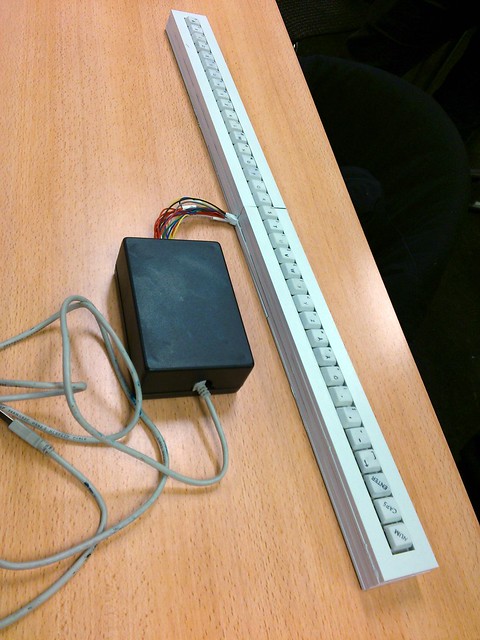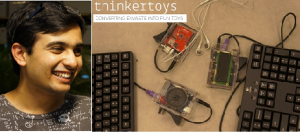SURVEY OF THE OPEN-SOURCE HARDWARE COMMUNITY
– March 28th, 2012
I’ve been helping Catarina Mota and others put together this open-source hardware survey. It’s an attempt to better understand who we are as a community and how/why we develop and use open-source hardware. We’d love to hear about your experiences with open-source hardware!
The survey will be up until April 15, and the aggregate results will be made publicly available in the form of a report consisting of graphics, percentages, and anonymized quotes. By publishing your (anonymous) responses, we hope to provide the public with insights into the practices and experiences of the people involved in open-source hardware.
ARDUINO MINIMENTARY
– March 27th, 2012
Tony Olsson shot this video the other day where you can see the back of my neck (David Cuartielles) while mounting one of the first Arduino boards ever made. The PCB showed up at our office at the bottom of a box together with one of the plastic mugs we used to deliver the kits to our students at K3 back in 2005.
ARDUINO USERS ARE GETTING YOUNGER: DAVIS FORTENBERRY, 10
– March 27th, 2012

Arduino users are getting younger! Davis Fortenberry, Age 10 designed his own robot and won The Institute of Electrical and Electronics Engineers, South eastern competition, in Orlando. He competed with a lot of college level teams and had a robot that was equally competent.
Davis, who has tinkered with robots since he was 5, built his “davibot” in a week, starting with an m3pi (“a robot in itself, really”) as the base.He added an Arduino (Italian microcomputer that tells the base unit whether to go left, right, straight ahead), then designed components for measuring contest specifics: voltage, capacitance, temperature and waveform.
He attends the Tennessee Virtual Academy an online approved school.
[Via: Commercial appeal]
OLD STYLE TWEET PRINTING MACHINE
– March 21st, 2012

The Twittertape Machine prototype from Adam Vaughan connects to his Twitter account via Ethernet, checks for updates twice every minute, and prints out a hard copy of any new Tweets without the need for printer ink.
Vaughan told us that the idea for the Twittertape Machine was born of a desire to have the kind of old stock ticker seen in movies sitting on his desk. After a lukewarm reception to his pitch from friends, he decided to make his dream a reality. Rather than sacrifice a rare original (like the Edison Universal Stock Ticker used for Ames Bielenberg’s Spring Break project), he opted to build his own replica version from some old brass clock movements, a wooden plinth and a glass dome found online.
It is powered by two AC adapters and is controlled by a network-enabled Arduino-style microcontroller running custom code in the base. The board checks Vaughan’s Twitter account every 30 seconds for new Tweets.
The little thermal printer hidden at the base prints the tweets on a cut-down thermal paper. An awesome product in an awesome demand!
[Via: Twittertape and Gizmag]
E WASTE TO TOYS: THINKERTOYS
– March 20th, 2012
Ever looked at a pile of E-waste containing perfectly usable electronic spare parts? Ever cringed at the thought of such aggregated piling waste from all the countries advancing in the field of technology? And all this waste being dumped in landfills in developing countries where kids who should be in school, work here for a meagre pay of a dollar a day.
Having seen this, ThinkerToys started as an idea to reuse this eWaste and convert them into fun toys for kids. The creations by Dhairya Dand,
a researcher at Keio-NUS CUTE Center, Singapore, was noticed by everyone at the ICTD (International conference on information and communication technologies and development), Atlanta 2012.
The design is simple: E waste + Arduino =

Keyano turns an ordinary keyboard into a piano! With the keys musically mapped to notes.

Basic addition, subtraction can be an invaluable skill for any kid. RandoMath is a small LED screen connected to your computer keyboard, and asks you random math puzzles.

Storynory has recorded fun stories in your local language, plug in the headphones or speakers for collaborative hearing.

Connect any old TV or CRT monitor and make it TV++, add a keyboard or a mouse for controls. This is a power packed mini computer designed for kids to be hooked on to the TV again, but this time for good reasons!
eWaste is directly connected to these toys without any modification. The resulting combination turns the eWaste (keybaord, mice, speakers, monitors) into something totally new and unexpected.
openTOYSis an ongoing project and more people might contact the creator for further development or for collaborating ideas. More of his works can be foundhere.
MAKER FROM INDIA: ANIRUDH SHARMA
– March 19th, 2012

A former student of a college located in the town Bikaner, Rajasthan(India), Anirudh Sharma (twitter, blog) is a maker with a lot of perseverance. His first project Sparsh (Video) during college days generated a lot of interest in the Indian Maker community. His regular work at HP labs as a consultant, and his most famous recent work which was presented at TEDx BITS, Goa, the shoe for the blind – Le-chal, has brought him to the attention of makers around the world.
The latest was him getting featured in the MIT Technology Review, India TR35 list as a ‘young technology innovator’ followed by a call to pursue further studies with MIT Media Labs.
A casual chat-up with him threw light on the way open source hardware is affecting the lives of independent makers of India.
Priya: Congrats Anirudh! How does it feel to be featured in MIT list of young inventors?
Anirudh: Feels great that our work is being recognized at that level. Its a great platform to meet other people in doing technology related work.
Priya: Could you explain the project that was featured for our readers?
Anirudh: Codenamed as le´ chal, it’s a way of communicating navigational information with an intuitive eye-free interface. We used pizeo vibrational actuators in the four sides of the shoe that ‘poke’ the user about the direction he needs to walk in. The system could fit within a shoe. The reason we used a shoe is because it is something that we can repeatedly use in our day to day lives. We’ve started a company – Ducere Technologies [website yet to be up] to take this forward as a full fledged product.
Priya: Which specific area interests you the most in the field of electronics?
Anirudh: [I am] Not much of an electronics guy, I started fooling around with transducers back in 2010. I like the research going on in area of MEMS/Biomechatronics though.
Priya: What prompted you to use Arduino?
Anirudh: [Laughs] Not being an electronics guy, Arduino was the easiest way for me to start prototyping. The high-level easy access to sensor data pushed me to choose this platform to begin with.
Priya: So, MIT media labs
Anirudh: Not thought yet. I’d love to explore tangible input to CAD systems, Raskar’s NETRA project which creates an inverse Shack-Hartmann sensor. This compiles to new hardware add-on to mobile phones for instant eye-prescription data. Other projects that interest me are AutoStereoscopic displays-BiDi screen, similar to explorations I did with my mentor ‘SriG‘(Sriganesh Madhvanath) at HP Labs.
Priya: I see that you have taken initiatives for the blind, what other areas can you see open source hardware solving problems?
Anirudh: If you’ve an idea that could touch lives, there’s nothing better than open source hardware to start your explorations with, as it not only provides the right tools but a community backing that you could rely on.
Priya: Any special blogs/people that you follow in the field of technology?
Anirudh: [I follow the works of] Arduino, MIT Tech Review, Seth Sandler, Bret Vitor, Aza Raskin, ladyada for it brings out fresh insights. In general, I admire works of VS Ramachandran, Feynman, Shwetak Patel and Bill Buxton.
Priya: Any other hobbies other than tinkering?
Anirudh: I play Portal 2, FarCry, trek to new places, and do photography.
MEAN MACHINES
– March 16th, 2012
I am proud to announce the final show for the Physical Prototyping course at the BA in Interaction Design at the School of Arts and Communication at Malmo University, Sweden. This year our students got to work under the brief “Mean Machines” and a whole series of seriously nasty objects were produced as a result. There is a one-in-a-lifetime opportunity to see these objects in action by coming to K3 on Friday March 23rd between 11.00 and 18.00. There will be a guided tour at 17.00, don’t miss it!
As an example, here a picture of the All-In-A-Row keyboard, trying to slow down the typing experience to the maximum:

(c) 2012 by its authors, All In A Row Keyboard
I love the way Tony Olsson, the course’s instructor, introduces the final show:
As always its not officially spring until the bachelor students at the Interaction Design program in Malmö present their final exhibition for the Physical Prototyping 1 class. At this one day only event the student will introduce you to some rude, anti social, annoying and politically incorrect technology made with a whole lot of love.
So head over to Malmö University’s School of Arts and Communication (K3) on the 23rd of March.The exhibition will open at 11.00 and at 17.00 there will be a guided tour where you will have the chance to meet up with the students behind these mean creations. The exhibition closes officially at 18.00 and then the unofficial party will start and move from K3 to continue elsewhere through the night.
You can find K3 on this map.
As a side note, Tony is also known for being behind the Open Softwear book.
DOODLE CLOCK-ROBOT USING ARDUINO
– March 16th, 2012
Watching the seconds go by is a frightening reminder that time pauses for no one, but somehow, a hacker going by the name of Ekaggrat has figured out how to make the process a bit less daunting. The so-called Doodle Clock is an Arduino-powered robotic arm that’s been trained to jot down the time with a dry erase marker; once the minute passes, he erases the last digit and rewrites it — a number beyond what he just erased.
More of Ekaggrat’s work can be found here.
YOUTUBE ‘LOADING’ ANIMATION WITH ARDUINO
– March 16th, 2012
It may be on a T shirt or it may be on a bag, either way it will look awesome! A simple DIY weekend art using your arduino and a few more common components.
Using an Arduino, a 9-volt battery, and eight ping-pong balls with a white LED inserted into each one, the ring of dots lights up in sequence, endlessly chasing its tail waiting for a non-existant video to load. A giant F5 refresh button would have really completed the costume, though, since that’s everyone’s secret weapon for getting a YouTube clip to finally load.
PYTHON MEETS ARDUINO
– March 12th, 2012
A nice talk by Peter Kropf at PyCon 2012 on using Python to control external devices through an Arduino.
[Via: peterkropf.com]












0 comentarios:
Publicar un comentario